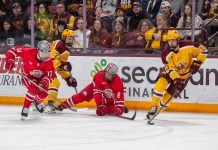The NCAA has announced rule changes that will take effect this upcoming season, following a recent meeting of the Men’s Ice Hockey Rules Committee. The most notable changes deal with instant replay and the way interference penalties are called, according to a report published by the NCAA.
Video replay, which is only used in regular- and postseason tournaments, came under fire during last season’s NCAA tournament when Colgate was denied an overtime game-winning goal in the East Regional first round. Colgate coach Don Vaughan was upset that the referee never asked to have the play reviewed.
Under the old rule, only the referee was allowed to ask for help from the video replay official. The new rule will require the replay official to review all goals before the following face-off, and call down to the referee if there is any question regarding the play. It is also possible, under the new rule, for a coach to challenge the on-ice call by requesting video review of a play. Regardless of the outcome of the challenge, the challenging team will be charged with a timeout.
During overtime of the game between Colgate and Michigan, Colgate appeared to score the winning goal before referee Jim Fitzgerald’s whistle had blown, but Fitzgerald disallowed the goal and would not allow replay to review the play.
The NCAA stated that the play was not reviewable under the instant replay criteria, even though an identical play was reviewed two weeks later in a game between Maine and North Dakota at the Frozen Four. Neither play would automatically be reviewed by instant replay, but the challenge option under this rule would have allowed to coach to ask for review of the replay if the referee had not already asked.
“The instant replay system works when it is used properly,” said Mike Sertich, chair of the Rules Committee. “The committee felt these changes would give the officials as many tools as possible to ensure the correct call is made.”
In addition to this change, the committee also instituted a penalty for obstruction. This comes in follow up to the NCAA’s emphasis on the already-established interference penalty over the past season. According to the NCAA, the committee was pleased with the improvement in handling of the interference penalty this past season, but felt more progress would be made with a specific penalty call.
This rule is a carbon-copy of one established by the National Hockey League during the 1997-98 season. Its intent is to penalize players that interfere with an opposing player away from the puck.
The rule reads: “Any player who interferes with a non-puck carrying player will receive a minor for obstruction. Obstruction will be called in front of the infraction (i.e. obstruction-holding).”
A new signal will also go into effect, which mirrors the NHL’s signal for obstruction.
“The emphasis on cleaning up the stick work and interference away from the puck has improved,” Sertich said. “The committee feels making a rule relating to obstruction will continue that improvement.”
Also, the NCAA has changed the return of man-power during certain shorthanded situations. The example given by the NCAA regarding the change is as follows:
“Team A has a major and a minor penalty assessed, and Team B also has a minor penalty. Team B scores. The minor penalty to Team A would be erased and a player would return to the ice.”
The rule will read: “If a short-handed team is scored upon while serving a major and a non-coincidental minor penalty (two different players), the minor penalty shall terminate.”
The Rules Committee defeated a motion to convert to a 4-on-4 overtime during the regular season. The NHL experimented with this rule in the American Hockey League during the 1997-98 season and then instituted the rule in NHL play this past season.
Other actions by the committee include: allowing the CCHA to continue with a two-referee, two-linesmen system; and a provision to allow play to continue when a net becomes dislodged while a scoring chance occurs at the opposite net. The committee also recommended that goal judges be actual officials whenever possible.


